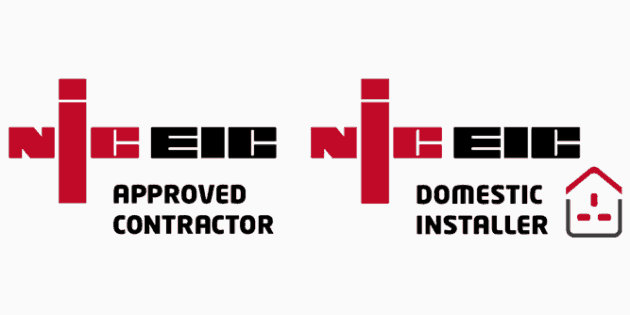
What Are the Benefits of Using a NICEIC Electrician
When you’re looking to hire an electrician, it can be a little challenging to understand the different types of electrical certification.
You’re likely to want to ensure that your electrician has the skills and experience to carry out work inside your home and using a NICEIC certified electrician helps guarantee this expertise.
Who is the NICEIC?
The National Inspection Council for Electrical Installation Contracting (NICEIC) is an industry organisation that provides certification and assessment services for contractors who work across the building sectors in the UK.
The NICEIC assesses electricians, plumbers, gas and heating engineers and renewable energy installers. This is extremely beneficial for householders who are looking to employ an electrician.
NICEIC registered electricians are regularly assessed to ensure that they are working safely and installing to the highest industry standards. This provides assurance that the electrician you hire has the skills, expertise, and training to complete the work safely.
The NICEIC has over fifty years of industry experience and has an influential position in the industry that has allowed the organisation to campaign on issues affecting the industry and consumers to make the electrical industry better.
NICEIC Certification
The type of certification depends on the type and extent of installation work you have had carried out in your home. There are electrical certifications for alterations, additions and new installations.
EICs (Electrical Installation Certificates) and MEIWCs (Minor Electrical Installation Work Certificates provide the person responsible for the electrical installation safety with a declaration that the alteration, addition or new installation is safe to be used when it was put into service.
These certificates provide a basic foundation if any further inspection or testing is required in the future. Presenting these certificates can save on potentially costly exploratory work that could be needed in the future.
The certificates also provide documentary evidence in the event of a claim that a fire or injury was caused by your electrical installation that show that the installation was completed to a satisfactory safety standard.
So, it is essential to keep your certificates in case of any insurance claim.
What Your EIC Will Indicate
Your EIC will show a number of details about the work completed.
In new installations, where a whole installation has been completed, it will show if a complete rewire was carried out.
The work Addition will be applied if your existing installation was modified by adding new circuits, while Alteration shows where existing circuits were modified or extended.
An example of this is if a new socket was added or if a fusebox consumer unit or switching equipment was replaced.
EIC certificates are required to be issued for any new electrical installation. In some cases, alterations or additions also require an EIC, depending on whether new circuits are installed.
Choosing an NICEIC Certified Electrician
Like a NAPIT certified electrician using a NICEIC certified electrician gives you a 6 year warranty on any electrical work carried out by the technician giving you more peace of mind that the work has been done properly.
Choosing the right electrician is such a vital part of ensuring the safety of your home and compliance with regulations, it is crucial to choose an electrician certified by a government backed body like the NICEIC.
Fortunately, all our recommended electricians are registered contractors with either the NICEIC or NAPIT to ensure that all work completed at your home is performed safely, to government standards and provide the certification to prove it for your protection and peace of mind.
If you’d like to speak to our recommended certified electrician in your area, you can find their details here.
Need A Qualified Electrician?
Popular Local Electricians
Need A Qualified Electrician?
Recent Reviews About The Electricians
Overall Rating:
Based on 1460 reviews
Amazing service, came to give us a quote on the same day and then started the next day. Chris was super helpful and efficient, got the job done in one day. Really great standard of work, definitely recommend!
Lorna Yates
Great help. Couldn't fix the problem but solved what was wrong so can get the help needed.
Wendy
Great job, quick and efficient, came in looked at the job and gave a quote and did it on the spot. I know who to call in the future.
Georgie Wilson
Sent request for call back x half an hour later x call back x and to my amazement booked me in the next day x my mum was over the moon xx excellent service from start to finish x highly recommend x 5 * service
Sandra Pillibg
ARRIVED AS PER SUGGESTED TIME AND DATE. DISCUUSSED REQUIREMENTS AND SUGESTED POSSIBLE ALTERNATIVES, IS TO CONFIRM IN EARLY COURSE. FOLLOWING SHORT BREAK WHICH HAD PREVIOUSLY BEEN ARRANGED.. THANK YOU.
Albert Routledge
I'm very pleased with the work carried out I've had 3 other electricians who said they would do the job but not come back even though I rang them several times would like to say thank you once again.
Monica
Really friendly great job and reasonably priced
Caroline Rajek
Prompt service, polite & efficient contractor
Bob Marchant
Very good job
Nigel
My Trusted Expert Guarantee
Experts Have Been Vetted & Approved